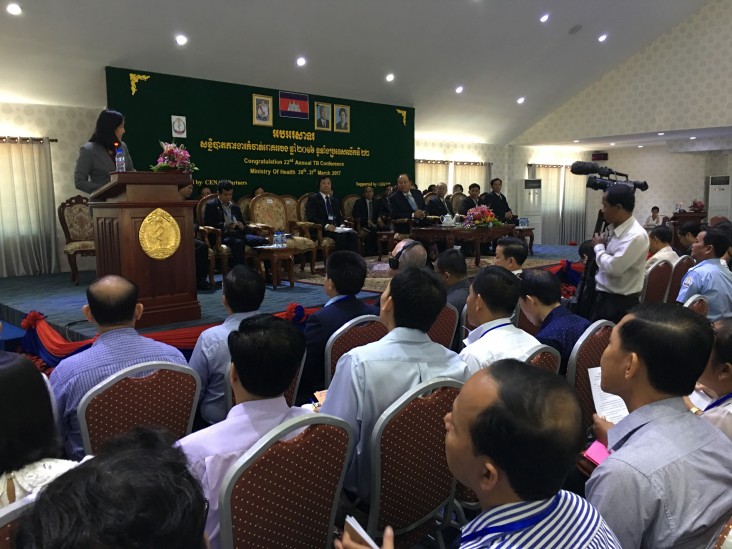
(as prepared for delivery)
- Your Excellency, Dr. Mam Bunheng, Minister of Health
- Your Excellency, Dr. Mao Tan Eang, Director of CENAT and Advisor to the Ministry of Health
- Dr. Liu Yunguo, Representative of WHO
- Distinguished Guests, Ladies and Gentlemen
It is a great pleasure to be here today at the opening ceremony of the 22nd Annual TB Conference, and I would like to thank CENAT for the invitation.
There has been important progress made in fighting TB in the last two decades, both globally and here in Cambodia, and I want to congratulate the Ministry and the National TB Program on that success.
But globally TB remains a major problem. Every year over ten million people are infected, and nearly 2 million lose their lives to TB. Over 4 million of those who fall ill each year do not receive a proper diagnosis or notification of their illness, leading to drug-resistant forms of TB and longer, harsher, and more expensive treatments.
Here in Cambodia, despite great achievements, we still see one of the highest burdens of TB within the region. For this reason, TB remains a priority for USAID Cambodia. We have narrowed the gap on missing TB cases significantly since 2000, but these still represent over one third of total cases. USAID, in partnership with CENAT, has been developing innovative ways to identify the missing cases such as targeted screening of the elderly at pagodas, improving diagnosis of TB among children, and strengthening linkages between hospital departments so that when patients with TB symptoms are seen at other departments, they are referred for TB testing.
To reach the goal of ending TB by 2035, we need to sustain the momentum of the past two decades and maintain the quality improvements that have been achieved long into the future.
Every one of us in this room should critically consider whether current TB interventions are effective and fit Cambodia’s needs today. For example, we applaud CENAT for expediting the use of the new short-course treatment for MDR to Cambodia. With this new short-course treatment, patients will suffer less from the potent, toxic MDR drugs and MDR treatment will be more cost effective for the country. We need to work together to find other cost effective interventions like this to end TB by 2035.
There is an impressive number of experts here today from the Ministry of Health, the Ministry of Interior, local government, civil society, the private sector, donors, and other partners. Let’s pledge together to learn from each other, to identify the challenges and the best strategies to overcome them. We can do this by working together in the spirit of true collaboration.
Over the next two days, we will discuss many of the exciting technical interventions that you have been implementing in the field but I ask that during these discussions that we also keep in mind the goal of sustainability. Donor assistance to Cambodia will not be here forever. So in order to keep momentum and reach our goals, we need to find sustainable funding models for TB control efforts. And we need to plan early – even now – for how the costs of effective TB control measures will be covered into the future.
In light of this, we need to review the current activities and ask ourselves:
- Is the approach effective, and is it on a path toward sustainability?
- Can we leverage other funding sources or find synergies with other programs to support TB activities
- Or perhaps, can we use existing mechanisms like the Health Equity Fund to incentivize healthcare workers and facilities to provide quality TB services?
Preparing for sustainability requires planning (and a little creativity), and that has to start now.
I want to congratulate the Royal Government of Cambodia for what has been accomplished so far – particularly the Ministry of Economy and Finance, and the Ministry of Health. These two ministries have already agreed to allocate funds from the national budget to cover the cost of all contract staff who work for the TB program and to procure first-line TB drugs. They have also committed to take full responsibility for the cost of first-line drug procurement by 2020. In addition, the Ministry for Economy and Finance has agreed to take the Primary Recipient role under the new Global Fund funding model for 2018 to 2020, which is a good foundation for long-term engagement and future financing for health programs.
I want to encourage our government counterparts to continue in this direction and work toward even greater ownership of the fight against TB.
USAID is committed to continue its participation in the global STOP TB partnership, its partnership with national TB programs, civil society and the private sector to support worldwide TB control efforts, including here in Cambodia. We are proud to be a part the effort in Cambodia, given the remarkable achievements of the National TB Program, and stand ready to help achieve the goal of eliminating TB by 2035.
Thank you again for inviting me to speak at today’s ceremony. I wish you a successful conference and fruitful discussion over the next two days.
Thank you!
Related Speeches
- Remarks by Polly Dunford, Mission Director, USAID Cambodia, Launch Event of Feed the Future Cambodia Harvest II
- Remarks by Christina Lau, Deputy Director, Office of Public Health and Education, USAID/Cambodia, Opening Ceremony of the Kick-Off Workshop for “One Health Workforce”
- Remarks by Veena Reddy, Deputy Mission Director, USAID Cambodia, EPIC Showcase







Comment
Make a general inquiry or suggest an improvement.